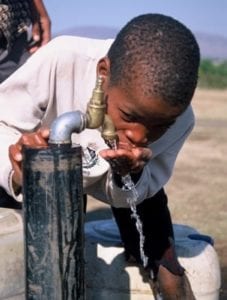As citizens in a semi-arid country, South Africans are wasteful water users, using as much as five times more water per person than we should. According to Peter Shepherd, partner and principal hydrologist in the Johannesburg office of SRK Consulting (SA), the problem is further exacerbated by the uneven distribution and seasonability of rainfall, with 43% of rain falling on just 13% of the land. Also, the major urban and industrial developments are remote from the country’s larger water courses.
He said that water consumption per capita in urban areas, where about 25% of our water is used, is about 200 ℓ/d– an unsustainable quantity for our available resources.
“We are not a country with unlimited water resources and our water usage will exceed our available fresh water within the next 20 years,” said Shepherd. “We urgently need to review our water usage habits,” he said. “The more water we use, the more we have to find and we are running out of cheap and easy places to source water.” South Africa already transports water great distances – about 10% of our water originates from Lesotho – and it becomes more expensive as these distances grow. “Our gardens are where a lot of our water goes, so we need a more ‘water-wise’ approach to how we design our gardens and choose our plants,” said Shepherd. “Being vigilant about water leaks is also vital; we could be losing in excess of 20% of our water supply through unattended leakages and ageing infrastructure, despite good progress being made to renew and improve municipal infrastructure.” He said we could learn from neighbouring countries like Botswana, where most low-cost houses are built with rainwater tanks and innovative methods are used to catch run-off in permeable areas that can infiltrate water into underground water systems. SkillsSouth Africa boasts top-class hydrological skills, which have ensured that the country has found ways to keep the taps on.
“We have some of the best hydrologists in the world, who have also developed very good modelling tools for us to understand and address our water-related challenges,” he said. An important factor that strengthens the country’s ability to manage scarce water resources is the solid statistical platform that underpins national strategies and the application of technologies. “However, our hydrology skills base is ageing steadily and there are not enough qualified youngsters coming through to fill the gaps that are forming,” said Shepherd. “The good news is that this is a broad and exciting field for young South Africans to consider as a career and the demand for skills is high.” There is plenty of potential, for instance, to research and understand more about fields such as groundwater flow, modelling, yields and sustainable exploitation. Even beyond hydrology itself, there are a range of disciplines involved in the water cycle, each of which is fertile ground for new skills development. “Hydrologists are engaged in quantifying volumes in surface and groundwater resources, and planning the size of dams, for instance,” he said. “Biodiversity experts would then examine the in-stream flow requirements to estimate how much water is needed to stay in the river to sustain downstream water users. Environmental and social scientists would explore the impact of a dam on downstream users, nearby villages and others affected by the project. Only then could engineers get to the design stage and work with the contractor to actually build the dam.” The hydrology profession, he said, is not doing enough to foster awareness among school leavers and promote the potential areas of work in the field of water management. “School children know what a lawyer or accountant does, but few school leavers know what a hydrologist is,” he said. “We’re not doing ourselves any favours by our reticence to better publicise the vast opportunities in this exciting field of work.”








